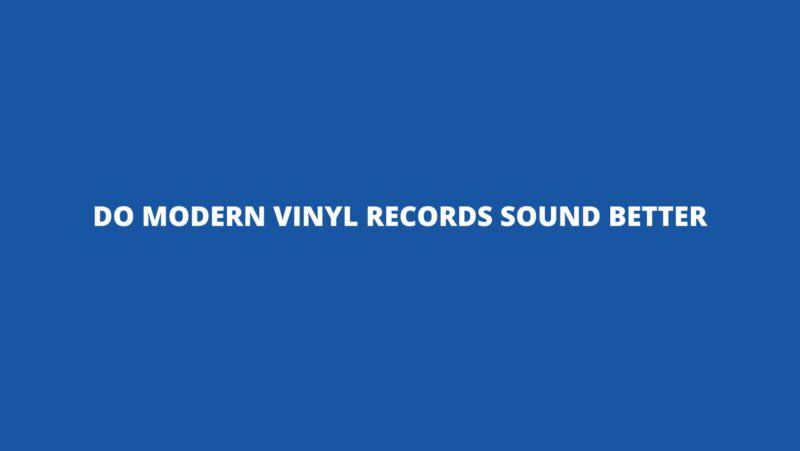The revival of vinyl records in the digital age has sparked discussions among audiophiles, collectors, and music enthusiasts about the sound quality of modern vinyl records compared to their vintage counterparts. While the analog warmth and tactile experience of vinyl have drawn many to embrace the format, the question remains: Do modern vinyl records truly sound better than their predecessors? This article delves into the nuances of vinyl production, mastering techniques, and the ongoing debate surrounding whether modern vinyl records offer an enhanced auditory experience.
Understanding the Vinyl Revival
The resurgence of vinyl records in recent years has been characterized by a blend of nostalgia and a desire for a more tangible music consumption experience. Vinyl’s resurgence has given rise to new pressing plants, advancements in manufacturing techniques, and increased attention to quality control. However, the debate over whether modern vinyl records sound better than vintage records is a complex one that involves various factors.
Factors Influencing Sound Quality
- Mastering Techniques: The process of mastering, where the final mix is prepared for vinyl production, plays a crucial role in sound quality. Modern mastering engineers are well-versed in both analog and digital processes, allowing them to optimize recordings for vinyl playback.
- Vinyl Formulation and Quality: Advances in vinyl formulation and pressing technology have led to improvements in surface noise reduction, dynamic range, and overall fidelity. Modern records are often pressed on high-quality virgin vinyl, which can contribute to improved sound quality.
- Equipment and Playback Systems: Modern vinyl enthusiasts have access to high-quality turntables, phono cartridges, and audio systems. These advancements in playback equipment can enhance the overall listening experience and reveal subtle nuances in the music.
- Quality Control: Modern pressing plants tend to have stricter quality control measures in place. This includes better quality checks during the manufacturing process to ensure that records are pressed accurately and without defects.
- Remastering and Reissues: Many modern vinyl releases are remastered from original analog tapes or high-resolution digital sources. Skilled engineers can enhance the audio quality while preserving the character of the original recordings.
- Availability of High-Quality Recordings: In some cases, modern vinyl releases offer access to high-quality recordings that were previously unavailable on vinyl or have been remastered to achieve superior sound.
Debating Sound Quality: Modern vs. Vintage
- Analog Warmth and Character: Advocates of vintage records often argue that the analog warmth and unique character of older pressings contribute to a distinct listening experience. They believe that the imperfections and idiosyncrasies of vintage vinyl add a certain charm that modern records may lack.
- Improved Manufacturing Techniques: Proponents of modern vinyl records highlight advancements in pressing technology, improved vinyl formulation, and better quality control. These factors can result in records with lower surface noise, improved frequency response, and enhanced overall sound quality.
- Variability in Quality: Both modern and vintage records exhibit a range of sound quality due to factors like mastering, manufacturing, and condition. The variability in quality means that generalizations about one being better than the other can be oversimplifications.
- Listener Subjectivity: Sound quality is inherently subjective and can vary based on individual preferences, listening environments, and equipment setups. What sounds superior to one listener may not hold true for another.
Conclusion
The question of whether modern vinyl records sound better than vintage records is not easily answered with a definitive yes or no. The reality is that advancements in vinyl manufacturing, mastering techniques, and playback equipment have enabled modern records to achieve high levels of sound quality. However, the distinct characteristics of vintage pressings and the sentimental value they hold for collectors cannot be discounted.
Ultimately, the decision between modern and vintage vinyl records comes down to personal preference. Audiophiles and collectors are encouraged to explore both options and form their own opinions based on their listening experiences. As the vinyl revival continues to evolve, the focus on sound quality, artistic expression, and the magic of analog playback remains central to the vinyl experience. Whether you find yourself drawn to the warm crackles of vintage vinyl or the pristine fidelity of modern pressings, the beauty of vinyl lies in its ability to offer a diverse range of musical experiences that resonate with enthusiasts across generations.


